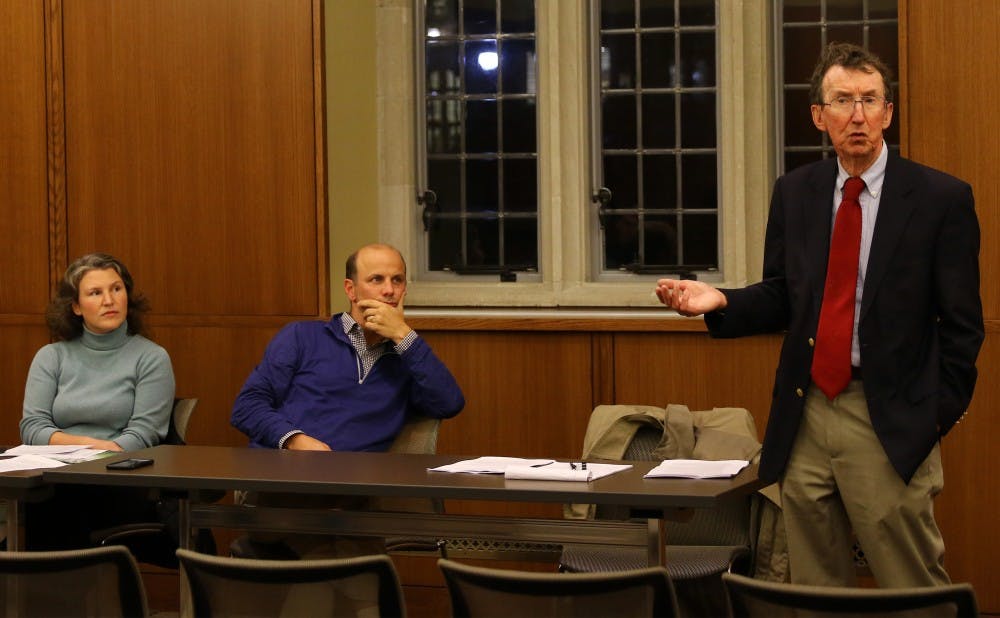The University’s Advisory Committee on Investment Responsibility hosted a public forum Monday night.
The meeting comes after a Sept. 21 letter from James Cox, Brainerd Currie professor of law and ACIR chair, which recommended that the University not adopt DukeOpen’s requests for increased investment transparency. Several student members of Divest Duke attended the forum and asked critical questions regarding the University’s endowment transparency and social responsibility. Cox expressed doubt that the transparency measures called for by DukeOpen would influence the University in a positive manner.
“The role of transparency and knowing what holdings we have is likely to produce more angst and anxiety than the good it would produce,” Cox said.
Tim Profeta, co-chair of the Campus Sustainability Committee, explained that Duke has already made carbon neutrality pledges and has made the switch from coal to natural gas. He and Cox stated that divestment from fossil fuels would prove difficult because of the symbolic message that would send in policy circles.
Noting that the University previously divested from Darfur and South Africa during its apartheid regime, Cox stated that divestment would effectively equate fossil fuel companies with conflict minerals and racial segregation.
“Investment is a meaningful social symbol,” he said. “At the same time, we believe symbolism moves the needle.”
Cox noted that he has yet to see Divest Duke’s student movement provide a sufficient explanation of what steps would follow divestment.
“Divestment is a one-time thing,” he said. “You might get a headline on Monday, but what are you going to do on Tuesday?”
Senior Rachel Weber, a columnist for The Chronicle, asked how much momentum a student movement would need in order to be deemed worthy of consideration by ACIR. She noted that the Divest Duke campaign has gathered more than 4,000 signatures as well as support from numerous faculty members. Cox responded that ACIR is focusing less on the amount of discourse and more on the quality of arguments being put forth.
Cox also noted that, to a certain extent, it is difficult to further reduce the University’s emissions beyond divestment.
“A lot of what’s purchased for the University is at the micro-level—purchased through employee credit cards,” he said. “How to manage that is difficult.”
Cox said ACIR recommended against disclosing a list of the endowment’s direct equity holdings, noting that the day-to-day holdings of the endowment are highly prone to change. He added that Dartmouth College—which implemented a policy where, four days a year, the public can look at a list of direct equity holdings without transcribing or taking photos—has only received two requests to view the data.
“It was not clear to us what was the ultimate benefit of seeing equity holdings at a particular point in time,” Cox said.
Bobo Bose-Kolanu, a graduate student in literature who was vocal in the DukeOpen campaign to promote investment transparency, asked if the committee would adopt any of the other transparency mechanisms the group advocated for.
Despite ACIR’s recommendations against the disclosure of a list of endowment holdings, Cox responded that the committee is improving transparency efforts on its website by finding and publishing proxy resolutions in response to requests from the DukeOpen campaign.
In other business:
Malcolm Bonner, a graduate student in economics and a student representative on ACIR, noted that Columbia University recently divested from private prisons. Cox noted that the committee will explore the issue of private prison divestment in its Dec. 3 meeting, and he expressed optimism about the prospect.
One audience member asked about the possibility of divesting from Iran. Cox replied that several issues relating to turmoil in the Middle East will be on the agenda at ACIR’s Dec. 3 meeting.
“We’re starting to do our homework in advance of that,” he said.
Get The Chronicle straight to your inbox
Signup for our weekly newsletter. Cancel at any time.

